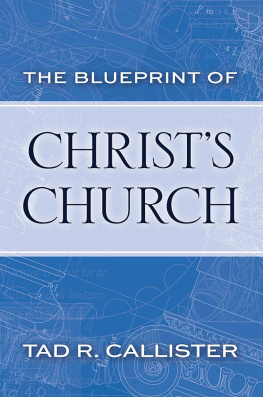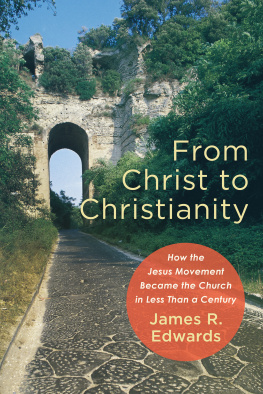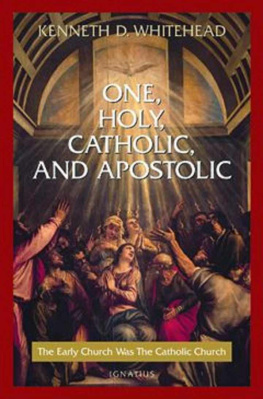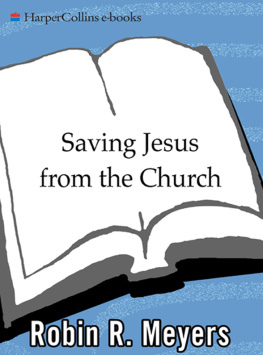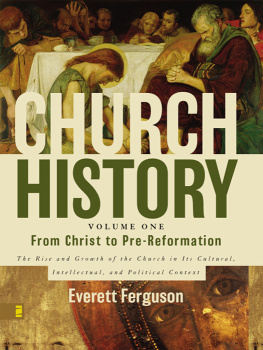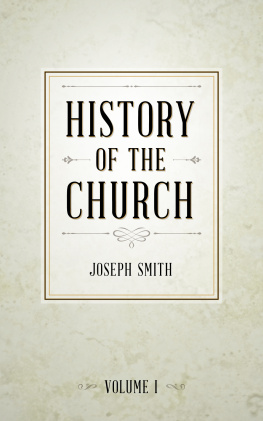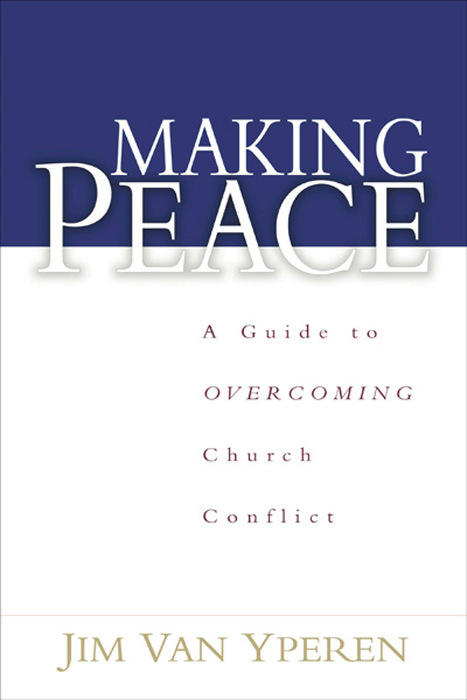
A Guide to Overcoming
Church Conflict

J IM V AN Y PEREN
2002 by
Jim Van Yperen
All rights reserved. No part of this book may be reproduced in any form without permission in writing from the publisher, except in the case of brief quotations embodied in critical articles or reviews.
All Scripture quotations, unless otherwise indicated, are taken from the Holy Bible, New International Version. NIV. Copyright 1973, 1978, 1984 by International Bible Society. Used by permission of Zondervan. All rights reserved.
Scripture quotations marked NASB are taken from the New American Standard Bible, Copyright 1960, 1962, 1963, 1968, 1971, 1972, 1973, 1975, 1977, 1995 by The Lockman Foundation. Used by permission. (www.Lockman.org)
Scripture quotations marked NKJV are taken from the New King James Version. Copyright 1982 by Thomas Nelson, Inc. Used by permission. All rights reserved.
ISBN: 0-8024-3185-2
ISBN-13: 978-0-8024-3185-1
We hope you enjoy this book from Moody Publishers. Our goal is to provide high-quality, thought-provoking books and products that connect truth to your real needs and challenges. For more information on other books and products written and produced from a biblical perspective, go to www.moodypublishers.com or write to:
Moody Publishers
820 N. LaSalle Boulevard
Chicago, IL 60610
5 7 9 10 8 6 4
Printed in the United States of America
For Sharon
Together
Blessed are the peacemakers,
for they will be called sons of God.
Matthew 5:9
But he was pierced for our transgressions,
he was crushed for our iniquities;
the punishment that brought us peace was upon him,
and by his wounds we are healed.
Isaiah 53:5
For he himself is our peace, who has
made the two one and has destroyed
the barrier, the dividing wall of hostility.
Ephesians 2:14
Make every effort to keep the unity of
the Spirit through the bond of peace.
Ephesians 4:3
For the kingdom of God
is not a matter of eating and drinking,
but of righteousness, peace and joy
in the Holy Spirit.
Romans 14:17
CONTENTS
ACKNOWLEDGMENTS
T his book is possible through the support and encouragement of many people. First and foremost I thank my wife, Sharon, and our children, Nate and Sarah, who joined me in the spiritual discovery of speaking the truth in love and in growing redemptive community. Their sacrifice, patience, and love for me is a treasured gift.
I am grateful to the founding board of Metanoia Ministries: Jim Bowen, Dave Brooks, Richard Bush, Darin Chin, David Fitch, Larry Keillor, Terri Noordmans, and John Ryser. They gave me the mandate and the freedom to complete this manuscript. Special thanks are due to David Fitch for helping shape my understanding of theology and biblical community during the past decade, and to John Soper, whose partnership in ministry during the past five years provided the platform to develop and refine the peacemaking principles in this book.
I am particularly grateful to our staff, Luanne Barker and Matt Brubaker, for their encouragement, proofreading, and for carrying on the ministry in my absence.
Finally, I am grateful to Elaine James, who provided early editing advice for the manuscript, and to Jim Bell and Jim Vincent of Moody Press, who guided this book to publication.
INTRODUCTION
I t was Sunday morning, the day after our report of findings to First Church. I was making my way to the pulpit to give announcements and welcome visitors to morning worship.
I had been the intentional interim pastor for six weeks already, spending ten hours a day, three days a week interviewing 209 current and former members. The findings were alarming.
First Church was in deep crisis. Attendance had dropped from five hundred to less than two hundred. In addition to interviewing current members, I had sent a letter to 119 families who had left the church in the past three years, asking them to tell me their story. Ninety-six people wrote back. Most sent multipage letters stapled to their survey. Story after story recounted anger, pain, and sorrow from unreconciled wounds. For most, this was the first contact from the church since they had leftmonths or years before.
The night before I had asked the entire governing board to resign and for the church to be placed on emergency rehabilitation status under the direction of the denomination. It was now my task to lead the church through the process of confronting, confessing, and reconciling the conflict.
I made my way to the lectern with two concerns: first, that the church face the crisis honestly and directly, and, second, to see the coming weeks as an opportunity to see God work.
The congregation was buzzing with handshakes and whispers. A few latecomers found their seats, and several parents hushed their children. We welcome you to our worship service this morning, I began. We are glad you are here. Most lifted their heads when they heard me say: And we offer a special welcome to those of you who may be visiting with us for the first time. You need to know that this is a sick church.
With those words, all the normal fidgeting and paper shuffling that goes on during announcements came to an abrupt halt. The sanctuary became stone quiet. People wondered if they had heard me correctly. Did he say sick? I paused, then continued.
The good news is that we know we are sick and that we are determined to change. So we invite you to come back over the following weeks and see what God is going to do in our midst.
After the service, two of the former elders made a straight line toward me. Both were offended and angry at my announcement.
Why? I asked. It is a true statement. We are a sick church.
This flustered them because they thought their reasons were obvious. Every church has problems, one man said. We are not that much worse than others. There is no perfect church, the other elder reminded me. We talked about their concerns and, having heard their point, I agreed that the word sick should not be used again. (The next week I said the church was not healthy.)
In the intervening months, God was gracious to reconcile past conflicts and set this church on a course of restoration. After six months, my work was done, and it was time for me to leave.
When I completed my final report to the congregation, a couple came up to me and said, We want you to know that the first Sunday we visited here was the day you said, This is a sick church from the pulpit. We could not believe you said that. We had been in a lot of sick churches before. This was the only place we heard a pastor admit it publicly. We knew we had to stayjust to see what God was going to do.
When church leaders and members are willing to honestly accept, openly confess, and intentionally address the underlying causes of church conflict, God will repair and restore the church. It starts with being truthful about current realitywith admitting we are sick. In the pages that follow you will learn why churches become unhealthy and how God wants to heal them so they may become thriving communities of faith.
You may be facing some level of conflict in your church or your life right now. Whatever your situationprivate or publicand whoever you arepastor or lay leaderthe church is the place God would have you reconcile.



